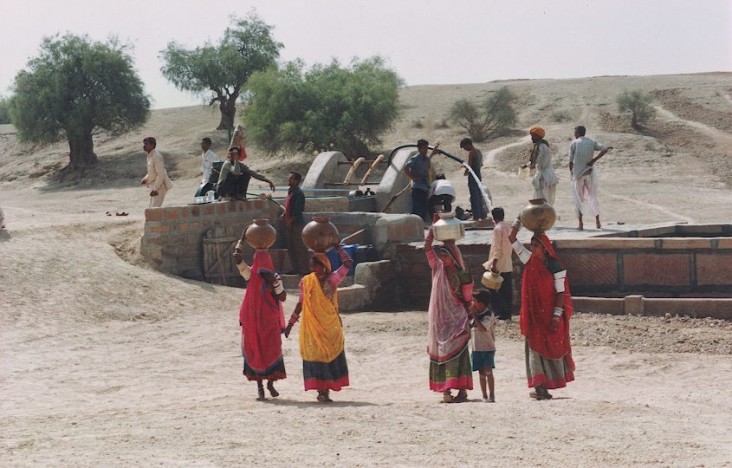- What We Do
- Agriculture and Food Security
- Democracy, Human Rights and Governance
- Economic Growth and Trade
- Education
- Ending Extreme Poverty
- Environment and Global Climate Change
- Gender Equality and Women's Empowerment
- Global Health
- Water and Sanitation
- Water and Development Strategy
- Advancing Water Supply, Sanitation and Hygiene
- Urban Sanitation
- Promoting Water Productivity and Efficiency
- Investing in Water and Natural Resources Management
- Enhancing Water and Disaster Risk Reduction
- Learning and Sharing in the Water Sector
- From The Field
- World Water Day
- Working in Crises and Conflict
- U.S. Global Development Lab

Residents fill up at a harvesting structure, which has made water readily available for drinking, agriculture and sanitation during the dry season.
Jal Bhagirathi Foundation
Sustainable development is not possible without water, sanitation and hygiene (WASH). Lack of access to safe water and sanitation services has direct health implications – almost 800,000 children under 5 die from diarrhea each year. And nearly 88 percent of diarrhea is attributed to unsafe drinking water, inadequate sanitation and poor hygiene. WASH interventions are an important tool for creating and sustaining healthy, thriving societies.
USAID’s Water and Development Strategy makes Water for Health a strategic objective to improve health outcomes through the provision of sustainable WASH by:
- Increasing first time and improved access to sustainable water supply;
- Increasing first time and improved access to sustainable sanitation; and
- Increasing adoption of key hygiene behaviors.
The Agency has been working hard to improve health through WASH:
- More than 3.5 million people were provided with improved access to drinking water supply and nearly 1.3 million with improved access to sanitation facilities in FY2013.
- Since 2005, USAID has partnered with The Coca-Cola Company to address community water needs in 24 developing countries around the world. In Senegal, this partnership focuses on improving water and sanitation infrastructure and services while also implementing hygiene education programs and promoting local governance of water and sanitation.
- USAID’s Development Innovation Ventures (DIV) program has partnered with the Bill and Melinda Gates Foundation to test and scale promising, cost-effective solutions in water, sanitation and hygiene through the WASH for Life partnership.
- USAID’s 5th Birthday Campaign is working with global leaders and partners to end child death from preventable diseases, such as diarrhea.
Related Projects
Related Sectors of Work







Comment
Make a general inquiry or suggest an improvement.